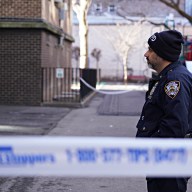It’s been a tough year at New Yorkers’ dinner tables.
Since January, families have been struggling with the unraveling of key programs and resources that put food on the table. The result? While we saw a drop in food insecurity during the pandemic, in 2023 it’s come back with a vengeance.
The numbers tell the story. Our 2023 No Kid Hungry poll showed 2 in 5 New York families experiencing food insecurity, and nearly 3 in 4 New Yorkers reported it harder to afford groceries this year than last.
So when Mayor Eric Adams recently announced a $60 million baseline budget cut to the Office of Food and Nutrition Services–the department within New York City Public Schools responsible for serving 850,000 healthy, no-cost school meals each day–it made a bad situation that much worse.
But this threat to the reliable, nutritious school meals many kids depend on was just the latest in a year of brutal hits to families’ food budgets. Critical nutrition benefits have been rolled back or put at risk by local, state and federal governments alike.
In the spring, we saw the year’s first strike against the federal Supplemental Nutrition Assistance Program (SNAP), which helps roughly 3 million New Yorkers–including 900,000 children–access healthy food. Emergency allotments that began during the pandemic ended, and people saw their monthly food benefits drop by at least $95. Some families saw their funds available to spend on food drop nearly $300–a huge loss that manifested at kitchen tables and in lunchboxes.
As deadlines to reach an agreement on the federal budget came and went this fall, government shutdowns became a concerning possibility, and federally funded programs – including those that feed families – faced devastating cuts and uncertainty. The Special Supplemental Nutrition Program for Women, Infants and Children (WIC), for example, supports almost 370,000 New Yorkers, and without additional funding, many could face waitlists for the first time in three decades.
These hits from all sides mean that many of our neighbors are struggling, making tough choices every day just to keep their kids nourished: skipping meals themselves, eating food that’s less healthy, simply eating less.
But we can solve this problem, and New Yorkers want exactly that: 9 in 10, in fact, want their elected officials to work on a bipartisan basis to do more to address childhood hunger.
And right now is a pivotal moment.
The State of New York can help shore up the benefits that families rely on, and one opportunity is right around the corner. The State has until January 1 to opt into a new federal program, Summer Electronic Benefits Transfer (Summer EBT), which would be a game-changer for kids in what is often the hungriest season of the year. Summer EBT could bring more than $200 million in new federal aid for meals, keeping kids healthy while also supporting businesses across the state as families spend those dollars.
The Governor also has the power to expand no-cost school meals as part of the next State budget. She would be following the lead of constituents across the state who, across political affiliations, races, ages, and beyond, overwhelmingly support no-cost breakfast and lunch for every student who needs it.
Back in Washington, November’s stopgap budget agreement avoided a catastrophe in the short term, but the clock is ticking for Congress to ensure critical programs like SNAP and WIC aren’t put in jeopardy next year. Most notably, we need lawmakers to fully fund WIC so it can continue to provide qualifying families with the resources to buy things like formula, milk and fresh produce. Without additional funding, 124,000 New Yorkers could be turned away in 2024.
And finally, right here in New York City, Mayor Adams must restore the $60 million in school meals funding that hangs in the balance. “I know several children personally where the meal at school is the only meal they get,” one woman in Queens told us. And hundreds of thousands more kids need that nutritious food to stay healthy and poised for success in the classroom.
2023 made it incredibly challenging for many families to feed their children–but in 2024 doesn’t have to be. We can do more than just prevent empty plates and lunch trays: we can expand the efforts we know work, and make it a healthy, nourishing year for all of New York’s families.
Rachel Sabella is the director of No Kid Hungry New York.





































